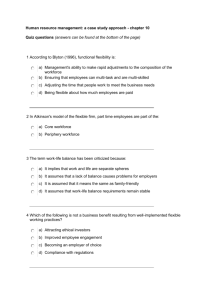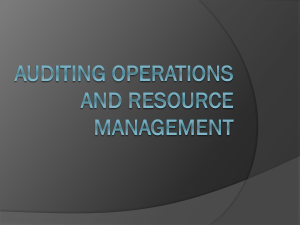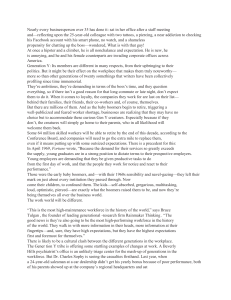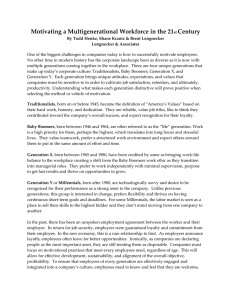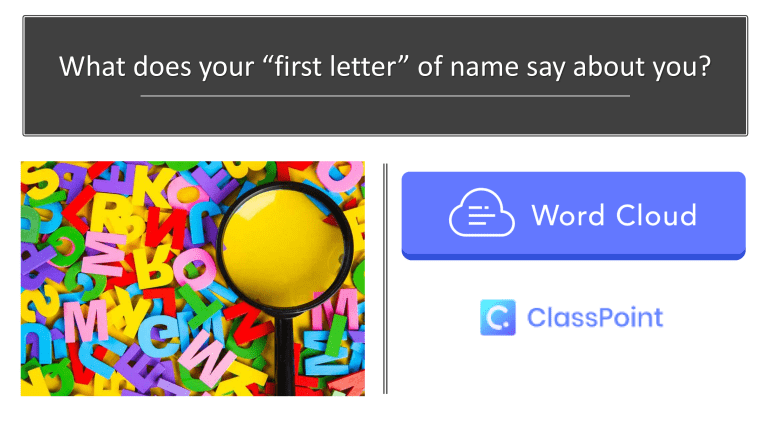
What does your “first letter” of name say about you? Organizational Behavior • • • • • • He has an entry level sales position with a computer software company • He spends time at the office and also travels to visit existing clients and build relationships with potential ones. • His company is motivating and supportive to their sales force and schedules frequent team building and training opportunities. • Manuel’s coworkers have diverse experiences and backgrounds and work well to support each other in their sales endeavors. • Rachel works as an entry level accountant at a high profile accounting firm. • She works long hours and spends a majority of her day in her cubicle working on her computer. • To meet impending deadlines, her supervisors now require Rachel’s team to work Saturdays. • Their team is understaffed to meet their deadlines so oftentimes work becomes sloppy when the team rushes to have something to present to the client. What is the best thing about your workplace? What is Management Theory? Organizational behavior has developed from management theory into a distinct field of its own. Theories help us understand our experiences by using research and observable facts. Management is the act of supervising and directing people, tasks, and things[1]. Management Theory is a collection of understandings and findings that help managers best support their teams and goals. The Importance of Management Theories help organizations to focus, communicate, and evolve allows leadership to focus on their main goals it automatically streamlines the top priorities for the organization allows us to better communicate with people we work with which in turn allows us to work more efficiently basic assumptions about management styles and goals can be assumed and can save time during daily interactions and meetings within an organization Different Management Theories Scientific Management Theory Administrative Management Theory Bureaucratic Management Theory Human Relations Management Theory General Systems Theory X&Y Management Theory Organization vs. Organizational Behavior What is Organizational Behavior? Organizational Behavior Organizational behavior is the study of how human behavior affects an organization. Organizational behavior aims to learn how an organization operates through the behaviors of its members. Three Levels of Influence • The individual level includes each individual person within an organization. Each individual acts differently which affects group dynamics and the organization as a whole. If there are a lot of happy and efficient individuals, the work environment will be an efficient and productive one. However, if there are a lot of negative and disgruntled individuals, it can create a toxic environment. Three Levels of Influence •The group level includes any groups within an organization. Groups can range in size from a couple people working together, to a large group with dozens or hundreds of members. Three Levels of Influence The organization level incorporates the organization as a whole. In case you haven’t picked up on the trend, it’s important to point out that the organization impacts the individual and group behavior and that individual and group behavior impacts an organization. t Historical Roots of Organizational Behavior • • • • • Historical Roots of Organizational Behavior • • • The Emergence of Organizational Behavior Precursors of Organizational • • • Behavior THE HAWTHORNE STUDIES • • • HUMAN RELATIONS MOVEMENT • • • • • HUMAN RELATIONS MOVEMENT • CONTEMPORARY ORGANIZATIONAL Characteristics of The BEHAVIOR Field Contextual Perspectives on Organizational Behavior Contextual Perspectives on Organizational Behavior • • • • Contextual Perspectives on Organizational Behavior • • Contextual Perspectives on Organizational • • Behavior Workforce Generations Baby Boomers: born between 1946 and 1964. Baby Boomers have been working the longest and have extensive knowledge and experience. They want and oftentimes expect others to value their input and opinions. Baby Boomers believe that hard work equates to long hours and that integrity in the workforce should be top priority. They are known to “live to work” and place extreme value on career advancement and promotion. They enjoy working in a team environment and are said to have created meeting culture. Workforce Generations Generation X: born between 1965 and 1981. Generation X has been through a roller-coaster of economic events. Downturns and upswings have impacted their career choices, career successes, and career futures. Unlike the Baby Boomers, Generation X has a more “work to live” mentality and value their life outside of the workplace. While they have a good work ethic, their work-life balance is of highest importance to them. Workforce Generations Generation Y: born between 1982 and 1997. Generation Y, also known as Millennials, are the youngest members of the current workforce. Generation Y typically grew up with two working parents and a to-do list constantly on display throughout their childhood. Because of this, Generation Y has the ability to multitask and also values work-life balance. However, differently from Generation X, Generation Y believes they need to accomplish things on their to-do list in order to enjoy their free time. Therefore, Generation Y tends to be very goal oriented and efficient. Workforce Generations Generation Z: born between 1997 and today. Generation Z has never known a world before technology. They have grown up in an “always on” world where technology is readily available and used on a regular basis. Technology has been utilized as a babysitter by many parents of this generation and it is also present in the classroom. This constant access to technology makes Generation Z extremely tech savvy but has also changed behavior and lifestyle. Whether or not these behavioral and lifestyle changes will carry on into their adulthood is yet to be determined. Generation Z is starting to enter into the workforce with the oldest members turning 23-years-old in 2020. Resources: https://courses.lumenlearning.com/wm-organizationalbehavior/ http://eduplanetbd.blogspot.com/2016/09/management-etymology.html CC licensed content, Original •Why It Matters: Introduction to Organizational Behavior. Authored by: Freedom Learning Group. Provided by: Lumen Learning. License: CC BY: Attribution CC licensed content, Specific attribution •Building. Authored by: Samuel Zeller. Provided by: Unsplash. Located at: https://unsplash.com/photos/YSugT45sIqw. License: CC0: No Rights Reserved. License Terms: Unsplash License
